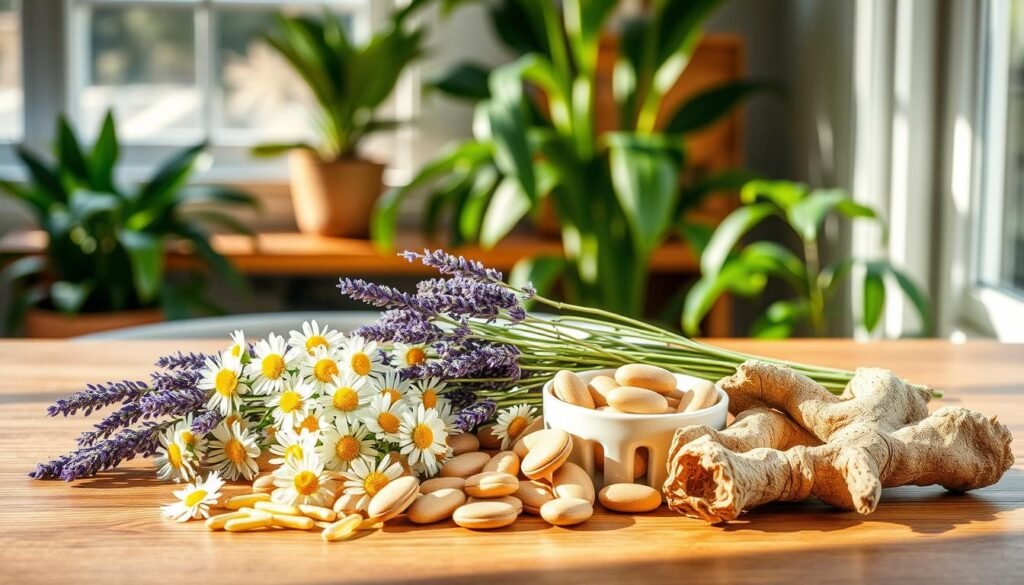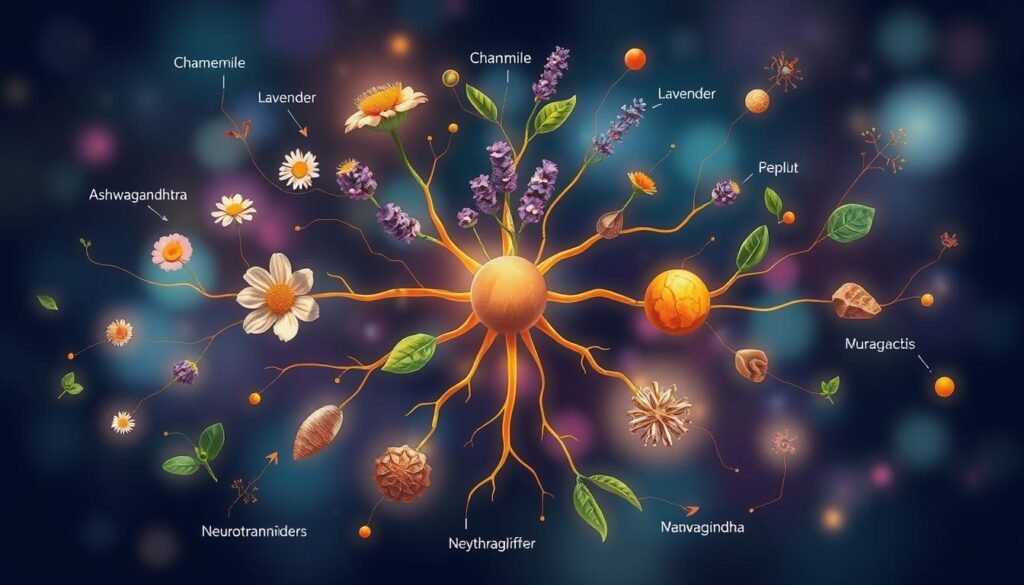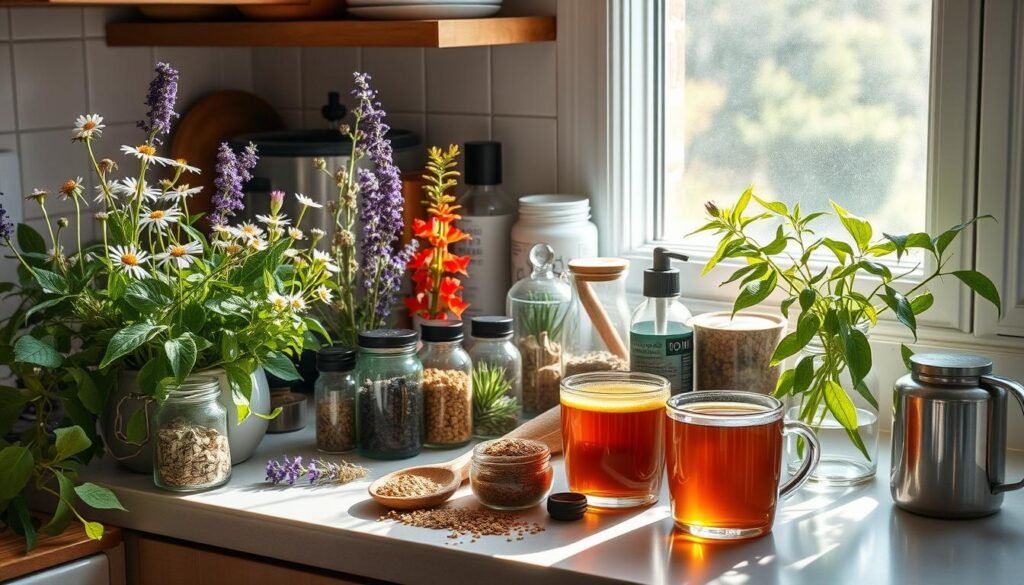About 40 million adults in the U.S. face anxiety disorders. This makes anxiety the biggest mental health issue here. Many are now looking at herbal supplements for help. Ashwagandha, chamomile, and valerian root are getting noticed for their possible perks in easing anxiety.
But, using these herbal options calls for caution. It’s key to put safety and results first. Always talk to a doctor before starting these supplements. We’ll explore various herbal aids for anxiety, looking at their features, pluses, and minuses.
Key Takeaways
- Over 40 million adults in the U.S. are affected by anxiety disorders.
- Herbal supplements are becoming popular alternatives for managing anxiety symptoms.
- Consulting a healthcare professional is crucial before trying herbal remedies.
- Several herbal options have shown promise in short-term anxiety relief.
- Understanding the risks and interactions of herbal supplements is vital for safety.
Understanding Anxiety Disorders
Anxiety disorders are a major mental health issue in the US, impacting 44 million adults a year. Those affected may deal with a variety of symptoms that disrupt their daily life. The most common types are generalized anxiety disorder (GAD), panic disorder, and social anxiety disorder.
Generalized anxiety disorder involves continuous worry over many life aspects. This can cause constant unease and trouble focusing. Panic disorder is known for sudden panic attacks, featuring intense symptoms like a fast heartbeat and difficulty breathing. Social anxiety disorder brings extreme fear in social settings, often leading to avoidance of such situations.
It’s vital to recognize and understand the signs of these conditions. Key symptoms include:
- Excessive worry
- Restlessness
- Difficulty concentrating
- Physical symptoms like sweating and trembling
These issues can worsen mental health, requiring effective handling. With many facing treatment access problems, exploring different options is important. This includes lifestyle changes and herbal supplements. Knowing more about anxiety disorders can help in finding better treatment and recovery paths.
What Causes Anxiety?
Anxiety disorders stem from both genes and environment. To understand why they happen, we look at these two main factors. These elements are key in shaping how anxiety develops.
Genetic Factors
Genetic predisposition matters a lot in anxiety. If family members have it, you might too. This is because genetics impact how our brain deals with stress. Lots of research supports the genetic link to anxiety, showing it’s important in finding the right treatment.
Environmental Triggers
Things around us can also kickstart anxiety. Stressful events or big life changes are common triggers. Bad experiences can make someone more prone to anxiety, so it’s essential to recognize these effects. Knowing what triggers anxiety helps in creating effective treatments. Herbal remedies have shown promise here. There’s interesting research on herbal options for managing anxiety.
Traditional vs. Herbal Approaches
It’s crucial to know the difference between treatments for anxiety. Traditional methods include drugs like SSRIs and benzodiazepines. These can help but often have side effects. About 8% of US hospital visits result from these drug’s negative effects. Every year, around 100,000 people die from these medications.
Herbal remedies for anxiety are becoming more popular as a natural choice. This trend is because people are unhappy with standard treatments. Now, over 42% of Americans have tried at least one alternative therapy. This shows many are seeking options outside traditional prescriptions. Yet, the safety and effectiveness of herbal remedies are still being studied.
Discussing the dangers of herbal remedies is crucial. Research shows that herbs like St. John’s wort, ginseng, and Ginkgo Biloba can react badly with standard drugs. This can make the drugs too strong, too weak, or cause severe side effects. Health experts are worried as more people choose herbal remedies for anxiety.
Even with these dangers, people still choose herbal treatments. They think these have fewer side effects and prefer natural options. But more research is needed. We must learn more about how safe and effective these herbal choices are compared to standard treatments. There’s a concern that valuable herbal knowledge could get lost as the world changes.
Herbal Supplements for Anxiety: An Overview
Herbal supplements for calming nerves are becoming more popular as treatments for anxiety. These products include a variety of plants known for their healing properties. Their use goes back centuries. People choose natural remedies for anxiety because they want to avoid side effects common with regular medicines. Herbs like lavender, kava, and chamomile are praised for their benefits.
Definition and Benefits
Passionflower and valerian root are herbs used for relaxation and better mood. Studies suggest they can help reduce anxiety symptoms. Passionflower may increase GABA in the brain, leading to calmness. Valerian root is known for its soothing effects and is often used to improve sleep. These supplements could help people with anxiety disorders. Reports say about 55.1 million Americans have tried herbs for anxiety. You can read more about herbal remedies here.
Risks and Considerations
When looking at herbal supplements for anxiety, understanding the benefits and risks is crucial. Not every herb is safe for everyone. For example, there are concerns for pregnant women or those on prescription drugs. Some side effects may be similar to symptoms of anxiety. A study showed that stimulation of the sympathetic nervous system is a common issue with supplements. Talking to healthcare professionals before using these herbs is important. They can help decide if they are safe and effective, especially for people with health issues. You can learn more about the risks here.

Top Herbal Supplements for Anxiety Relief
Exploring top herbal supplements for anxiety relief offers new options for managing anxiety. Each supplement has unique benefits that may ease anxiety and boost well-being.
Ashwagandha
Ashwagandha is popular for reducing stress with its adaptogenic qualities. It lowers cortisol levels, helping to ease stress effects. Research suggests it can improve anxiety symptoms over time.
Chamomile
Chamomile is more than a soothing tea. Studies show it can help with generalized anxiety disorder symptoms. But, it can affect how blood thinners work.
Valerian Root
Valerian root is known for helping people sleep. But it also may help with anxiety. People should use it carefully since its long-term safety isn’t confirmed.
Passionflower
Research indicates passionflower might help reduce anxiety in the short term. While useful, its safety during pregnancy is unclear. Always talk to a healthcare professional before using it.
| Herbal Supplement | Main Benefits | Considerations |
|---|---|---|
| Ashwagandha | Reduces cortisol levels, alleviates stress | Consult healthcare provider for interactions |
| Chamomile | Helps with generalized anxiety symptoms | May interact with blood thinners |
| Valerian Root | Promotes sleep and may ease anxiety | Long-term safety not well established |
| Passionflower | May reduce anxiety, particularly in short-term use | Safety during pregnancy not confirmed |
Considering herbal remedies for anxiety? Talking to a healthcare professional is key. For more on natural remedies, visit this site.
How Do Herbal Supplements Work?
Herbal anxiety remedies work by their active compounds acting on the body’s systems. For instance, ashwagandha helps reduce stress hormones. This brings a sense of calm and balance. It shows how herbal supplements can lessen anxiety through body chemistry.
Valerian root is another key example. It activates GABA receptors in the brain, aiding relaxation and easing anxiety symptoms. Knowing how these herbs work is crucial. They provide real mental health benefits.
Various herbs have unique effects that make them effective. Curcumin, from turmeric, reduces anxiety significantly. Saffron has antidepressant and anti-anxiety benefits. Understanding these mechanisms builds trust in herbal anxiety remedies.

People are choosing herbal solutions more and more. Knowing how they ease anxiety empowers them. This knowledge boosts confidence and encourages a natural, healthy lifestyle.
Safety and Side Effects of Herbal Supplements for Anxiety
It’s important to check the safety of herbal supplements, especially for those looking for anxiety relief without mainstream meds. Many herbal treatments have benefits, but they also pose risks like side effects and interactions with other meds. Before starting any herbal treatment, think about these potential drawbacks.
Potential Interactions with Medications
Herbal supplements aren’t as strictly monitored as regular drugs, which brings up safety concerns. Take St. John’s wort, for example. It might boost your mood but can weaken the effectiveness of birth control and certain other drugs. Kava can help reduce anxiety, but using it a lot can harm your liver. This is especially true if you mix it with alcohol or certain meds. Then there are plants like comfrey and pennyroyal. They’ve been used traditionally but can seriously damage your organs. It’s best to steer clear of them.
Common Side Effects
Pay close attention to the side effects of herbal remedies. You might feel dizzy, nauseous, or tired. Some herbs, like black cohosh, can be helpful but are also linked to liver problems. And chamomile might cause an allergic reaction in some people. Since the risk with herbal supplements can vary a lot, talking to a doctor before mixing them with other treatments is crucial.
Natural Remedies for Stress Management
Anxiety affects over 19% of US adults yearly. This makes finding good remedies crucial. Natural options for stress management can be great add-ons to other treatments. They let people not just ease symptoms but also improve their mental health over time.
Additional Holistic Approaches
Combining different practices can boost the power of herbal anxiety remedies. Mindfulness, yoga, and meditation are key for lessening stress.
- Mindfulness: This practice helps people stay in the now, breaking cycles of worry.
- Yoga: Yoga can balance the nervous system and cut down on anxiety.
- Meditation: Studies show meditation calms fast thoughts, helping manage anxiety.
- Exercise: Regular, intense workouts are great for easing anxiety.
- Journaling: Writing down feelings can help manage stress and emotions.
- Proper Nutrition: Eating right supports mental well-being with key nutrients for emotional health.
- Essential Oils: Lavender oil, in studies, helps lower anxiety, offering a simple way to relax.
- Pets: Animal friends improve mental health, providing comfort in tough times.

Therapy, especially cognitive behavioral therapy (CBT), is tops for treating anxiety. CBT gives people skills to recognize their anxiety triggers and make positive changes in their lives.
Mixing these holistic methods with a plan for managing anxiety boosts the effectiveness of herbal remedies. Together, they form a full strategy for reducing stress and building emotional strength.
Choosing the Right Supplement for You
Choosing the right herbal supplement takes some thought. Think about your health needs and any conditions you have. Knowing how to choose herbal supplements means understanding their interactions with medications, especially for those on treatment plans. It’s wise to talk to a healthcare professional before starting anything new.
When searching for the optimal herbal treatment for anxiety, it’s important to pick reputable brands. These brands should prove their quality with third-party testing. Since the FDA doesn’t closely watch over the supplement industry, checking for certifications can give you peace of mind.
Keep these key points in mind when picking herbal supplements:
- Look at your health status.
- Ask if supplements could affect your current medications.
- Research brands’ safety and transparency.
- Get advice tailored to you from healthcare pros.
- Think about joining forums to learn from others’ supplement experiences.
A lot of Americans turn to dietary supplements for better health. About half of the adults in the U.S. use them, aiming to fix nutritional gaps or boost their mood. Articles like this one talk about how some supplements, including vitamin D, magnesium, and valerian, might help ease anxiety.
| Supplement | Potential Benefits | Considerations |
|---|---|---|
| Vitamin D | Supports mood regulation | Deficiency common due to lifestyle factors |
| Magnesium | May enhance relaxation | Monitor dosage for potential digestive upset |
| Valerian | Promotes sleep and calmness | Consult on dosages; may interact with sedatives |
| Chamomile | Reduces anxiety and aids sleep | Verify allergy history with ragweed |
| Lemon Balm | Helps alleviate stress and improve sleep | Potential interaction with thyroid medications |
With anxiety disorders on the rise, making smart choices about supplements is key. Always put your health first and do your homework when managing anxiety.
Conclusion
Herbal supplements are becoming a popular choice for managing anxiety. They offer benefits but require smart decision-making. With the rise in their use, especially by those feeling anxious or depressed, it’s important to look into them. Supplements like kava and inositol could be very helpful, but you should talk to a doctor first.
Consulting with healthcare providers is key before adding herbs to your treatment. They can guide you on safely using these supplements alongside other medicines. There might be risks, like minor side effects from St. John’s wort or passionflower. By understanding these supplements better, you can make choices that fit your health needs best.
Combining herbal remedies with expert advice and lifestyle changes might be the best strategy for reducing anxiety. As interest in natural treatments grows, exploring these options carefully can lead to improved mental health.